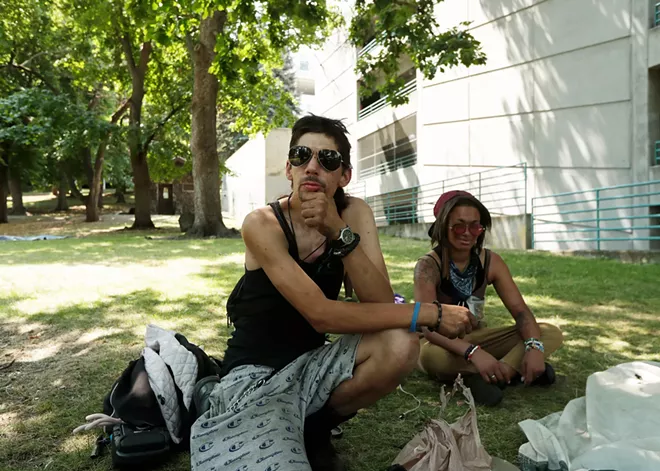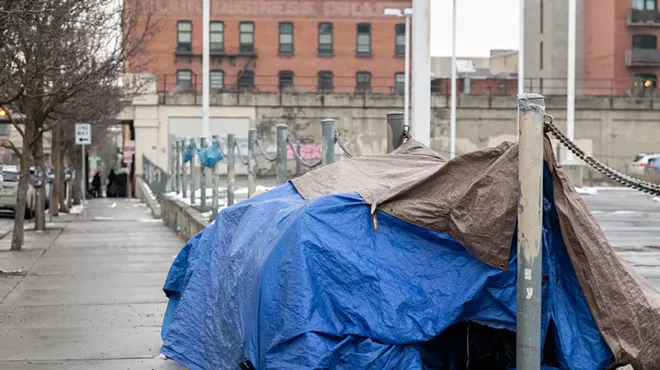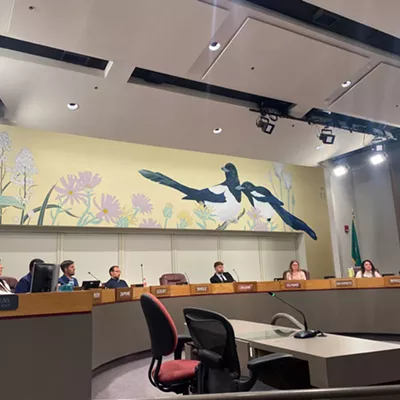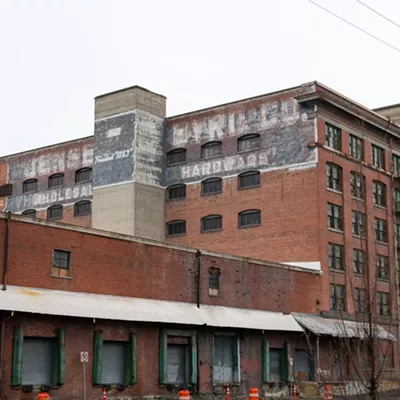
There's relief in the shade.
It's noon on Friday, July 19. About 30 people, apparently unhoused, are seeking shelter from the sun under trees in Cowley Park, a 2-acre park nestled in the South Hill medical area a few blocks south of the freeway. People are scattered across the grassy field in groups of three to 10, sitting next to tarps and piles of belongings.
The air is dry. It's 91 degrees and rising. A couple people are smoking fentanyl, but most appear to be simply chilling out and trying to beat the heat. The park is close to the downtown core and has seen an influx of people as temperatures surged in recent weeks.
"There's shade and it's more peaceful," says Champagne Liddle, who is homeless and sitting under a tree with a group of people in the northwest corner. "There's no drama or anything down here. Everyone's just peaceful and quiet and stays to themselves."
During the heatwave, Cowley also has one big feature that most other city parks lack: a small creek.
"That creek is a really vital resource," says Levi Flagel, a friend of Liddle's.
Flagel says he and others staying in the park sometimes use the creek to wash up and clean themselves. It's like a "bird bath," he says.
While Flagel doesn't personally drink from the creek, he says some other people staying in the park do.
"In heat, you've gotta have water, right?" Flagel says.
STAYING COOL
Spokane City Council member Paul Dillon arrives at the park shortly after noon."I'm with the City Council, I'm just coming to see how things are going down here today," Dillon says to Flagel and Liddle. "Are you staying cool down here?"
Dillon's district covers Cowley Park. He decided to check it out — coincidentally at the same time we did — because of an unusual email he received from Julie Garcia, the CEO of homeless nonprofit Jewels Helping Hands.
On July 11, Garcia had emailed Dillon, Mayor Lisa Brown and other city officials with a list of recommendations for how the city can better address its homelessness crisis. One suggestion stood out.
"Sweep Cowley Park," Garcia wrote.
It wasn't the type of message you'd normally expect from Garcia. She's an outspoken homeless rights advocate who regularly does outreach handing out water and food to homeless people across the city. In her email, she stressed that she has never been one to encourage police sweeps.
"This is one exception," she added. "This park needs [to be] swept for the sake of those children and families."
Garcia tells the Inlander that she's concerned by the amount of drug use in the park. She was alarmed by the sight of a woman bathing in the creek, and she worries about children at the hospital and nearby day care. The number of people camping at the park has grown rapidly in recent weeks, she says.
On the same day as Garcia's email, Spokane Low Income Housing Consortium Director Ben Stuckart told a crowd of supporters at a fundraiser for his run for state Legislature that he'd counted 64 people at Cowley Park while handing out water there earlier that day.
When I drove by that evening, the number appeared closer to 25 or 30. It was still a pretty shocking scene. The park is tiny — just 316 feet long and 264 feet wide. Every corner seemed occupied by a tarp or a tent.
Garcia suspects that recent efforts to clamp down on drug activity and camping in the area near Second Avenue and Division Street — which was recently designated as a "priority encampment zone" under the state's Right-of-Way Encampment Resolution Program — has pushed some homeless people away from the downtown core and into Cowley and other nearby parks.
I wasn't able to independently confirm this. The five people at Cowley I talked to on Friday all gave varying reasons for being there, including the fact that it's shady, quiet and a place where you're less likely to get told to move by law enforcement. (I wasn't able to talk to everyone at the park; some groups were suspicious of the question and didn't want to talk.)
After seeing the park for himself, Dillon says he disagrees with Garcia's assessment that it needs to be swept.
"People are here to cool off, it's clean, I'm not seeing litter," Dillon says. "If you're coming here to cool off, you're not breaking any laws. We need to be humane."

A NEW SHELTER MODEL
Both Liddle and Flagel say they're frustrated by the lack of shelter options provided by the city."They say go to the shelters or whatever, but the shelters are at maximum capacity right now," Flagel says. "We get on our phones, and we check every single day."
The city has a website called sheltermespokane.org where people can check shelter capacity. It assigns each shelter a color based on capacity: Green means more than 25% of beds are open, yellow means less than 25% are open, and red means the shelter is full.
On Friday, the website looked like a wildfire.
Family Promise, House of Charity and Hope House Women's Shelter were all full. The Crosswalk Youth Shelter had four beds, Truth Ministries had seven beds, and the YWCA Domestic Violence Shelter had one bed.
The city's largest shelter, the Trent Resource and Assistance Center, listed 65 of its 350 beds as open. But Dillon notes that the shelter is way out in an industrial area and not easy to get to.
Dillon tells Liddle and Flagel that the city is working toward a new "scattered site" shelter model. The new approach is part of Mayor Brown's plan to de-congregate homeless services, and will involve a number of small shelters with space for 20 to 30 people scattered across the city. Dillon says the conditions at large congregate shelters with hundreds of beds are inadequate, and that the scattered site model would be calmer and safer while also reducing neighborhood impact.
During a recent meeting, Arielle Anderson, the city's Community, Housing and Human Services director, told City Council members that the scattered site model also gives providers space to give clients the individual attention they need.
"We're going to take the time to get to know you, understand what your needs are, where you're at medically," Anderson said.
The city has put out a request for proposals for operators to run the shelters. Officials have yet to identify locations.
The scattered site model was inspired in part by an effort Garcia spearheaded this winter to use churches across the city as warming centers with space for 20 to 30 people each. The program launched in January this year, and was touted as a success by city leaders. But Garcia says it has recently started running into hurdles at the two churches that continue to operate as shelters: New Aposolic Church and Morning Star Baptist.
The church shelters operate on "more of a high-barrier" referral system, Garcia says. That means people can only get a bed if they agree to rules regarding substance use and have been screened and referred by a local service provider. But not everyone knows that. Garcia says people from downtown have recently been traveling to the churches because they incorrectly believe they'll be able to get a bed for the night. It's resulted in an uptick in safety incidents and calls to police, she says.
Between Jan. 1 and July 21 this year, there were 23 calls for service at the New Apostolic Church, according to Julie Humphreys, a spokesperson with the Spokane Police Department. There were four during the same time period in 2023, before it was operating as a shelter.
Morning Star Baptist saw a similar increase — from 2 calls for service during the first six and a half months of 2023 to 27 during the same time period this year. The people causing issues aren't the ones staying at the churches, Garcia says.
"It's people coming onto our property looking for beds to go to and refusing to leave," Garcia says.
Garcia's organization has applied to be one of the operators for the city's new scattered site plan, but she isn't sure if she'll get it because the city is looking for a more "low barrier" model. As the city prepares to close the Trent shelter, she's worried the new plan won't be enough to replace it.
"We're going to head into winter in a few months, the scattered site models are definitely not enough," Garcia says.
HUMAN NEEDS
Liddle, 24, says she grew up in and out of the foster care system in Spokane. She was recently in California, but returned to Spokane about a month ago because the father of her children was arrested, and she's hoping to regain custody. She's on a waitlist for housing, but says it's taking forever.Sometimes Liddle is able to stay with friends. But when she isn't, she'll sometimes sleep downtown in the area near Second and Division. She says she'll often pay someone to watch her and make sure she's safe while she sleeps.
"Sometimes I don't really sleep, just because you never know," Liddle says.
The bathroom in Cowley Park is closed, and the water fountains are shut off. Dillon says that's "unacceptable," and tells Liddle he'll talk to the Parks Department to get it turned back on.
"That's a huge frustration, this is a bodily function," Dillon says.
While we're talking, a man arrives at the park with a crate full of plastic water bottles and stashes them in the creek to keep them cool.
In an email, Parks spokesperson Fianna Dickson says the bathroom and water fountains have been out of service all season because of a sewer issue. A porta-potty was in place earlier this summer, but later removed because of repeated vandalism, she says.
Dillon and other advocates have long argued that Spokane's public restroom shortage is a public health issue that impacts everyone — not just homeless people. In June, the City Council considered spending $100,000 in federal pandemic relief funds to study the idea of installing public restrooms, but ultimately decided to use the money elsewhere.
The idea of adding public restrooms has been floating around for years, but some groups have pushed back. In 2021, a survey commissioned by the Downtown Spokane Partnership found that 56% of downtown property and business owners believed building public restrooms would "only further enable life on the street."
'BEING HOMELESS IS NOT A CRIME'
Over the weekend, temperatures soared to 105 degrees. Dillon visited Cowley Park again on Sunday and counted about 25 people."Everyone minding their business in the shade, very calm," Dillon said in a text.
Next month, the City Council will consider a law introduced by Council members Kitty Klitzke and Lili Navarrete that would add "housing status" to the city's list of protected classes. If passed, the law would strengthen homeless peoples' property and privacy rights and increase protections against discriminatory hiring.
The move to add homelessness as a protected class comes as the city grapples with how far it wants to go in criminalizing homeless people for camping in public.
Last month, the Supreme Court ruled to reverse Johnson v. Grants Pass, a precedent-setting 9th U.S. Circuit Court of Appeals decision that found it's unconstitutional for cities to punish people for camping outside when there isn't sufficient shelter space.
The Supreme Court ruling gives Spokane the go-ahead to implement broad camping bans. That includes Proposition 1, the citizen ballot initiative passed in November that made it a misdemeanor to camp within 1,000 feet of schools, parks and child care facilities — an area that covers 60% of the city.
Proposition 1 has previously gone unenforced, but earlier this month City Attorney Mike Piccolo told City Council members that the Supreme Court ruling means Spokane has no legal reason not to enforce the law.
"Our flexibility is much greater now," Piccolo said.
Dillon says he hopes the city will move toward a model where outreach workers, not police, are the first to respond to encampments. He says he is also working on an ordinance to make sure people's belongings are secure when camps are cleared.
At Cowley Park, Dillon tells the group sheltering under the tree that "being homeless is not a crime."
"Well they're making it a crime," Flagel responds. "Why is that? Is that fair?"
"No," Dillon says. "It's not fair." ♦
Correction: This story was updated on July 26 to correct an error about the status of funding for a study about installing public restrooms.

























